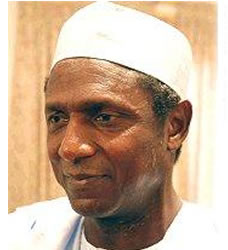


Posted by By LUCKY NWANKWERE, Abuja on



President Umaru Yar'Adua has directed that henceforth all government agencies involved in the prosecution of criminal offences, such as the Economic and Financial Crimes Commission (EFCC) and the Independent Corrupt Practices and Other Related Offences Commission (ICPC) should report to the Attorney-General of the Federation and Minister of Justice, Mr. Michael Aandoakaa.
•Orders them to report to Minister of Justice
President Umaru Yar'Adua has directed that henceforth all government agencies involved in the prosecution of criminal offences, such as the Economic and Financial Crimes Commission (EFCC) and the Independent Corrupt Practices and Other Related Offences Commission (ICPC) should report to the Attorney-General of the Federation and Minister of Justice, Mr. Michael Aandoakaa.
Also henceforth, none of the anti-corruption agencies will initiate criminal proceedings against anyone in the country without the consent and approval of the minister as specified in relevant sections of the constitution, he ordered.
The Special Adviser to the President on Communications, Mr. Segun Adeniyi, who made this known in Abuja on Monday when he addressed State House correspondents, said the order was to enable the Attorney General of the Federation exercise powers conferred on him pursuant to Section 43 of the EFCC Act 2004 to make rules or regulations with respect to the exercise of any of the duties, functions or powers of the EFCC.
Reacting to media reports suggesting that the president was hampering the activities of the EFCC in the fight against corruption, in a bid to ‘protect' some former governors, who allegedly bankrolled his campaign, Adeniyi said there was no iota of truth in the allegation.
Said he: "I state very categorically that nothing can be farther from the truth. President Yar'Adua is very serious about his commitment to instilling discipline, transparency, respect for the rule of law and due process in the conduct of government business and remains resolute in his resolve to fight corruption and abuse of office.
"I also want to state that the president will support all the agencies of government responsible for bringing to justice people found to have abused their offices either in the past, now or in future."
Adeniyi said the president was mindful of the fact that any goal pursued without recourse to due process and rule of law would be antithetical to the promotion of democracy and could only achieve short-term results.
"President Yar'Adua firmly believes that in fighting corruption, nobody and no institution, and this includes the Presidency and himself as president, should be seen to be above the law and the constitution," he added.
It is for this reason, Adeniyi pointed out, that the president acceded to the requests of the Attorney General of the Federation and Justice Minister that the anti-corruption agencies should report to him and carry out their activities with his consent and approval.
He explained that the decision to enforce the powers of the Attorney-General of the Federation was solely motivated by President Yar'Adua's respect for due process and the rule of law and not by desire to shield anybody from criminal prosecution.
He said: "President Yar'Adua has also granted the Attorney-General's requests to ensure better coordination among the country's law enforcement agencies and avoid untidy multiple criminal prosecutions as are being currently undertaken by the EFCC, ICPC and the Code of Conduct Tribunal in respect of the same alleged offences.
" Yar'Adua's administration will never provide a safe haven or escape route for anyone, no matter how highly placed they may be and irrespective of whatever role they played or claim to have played in his election, if they are found to have soiled their hands by looting public funds for their personal aggrandizement."
The EFCC and ICPC Acts established that the power of prosecution derives from the explicit and/or implicit consent of the Attorney-General of the Federation who has unfettered and absolute power of prosecution.
It will be recalled that EFCC boss, Mallam Nuhu ribadu had argued in the past that the authority to prosecute is vested in the Attorney-General of the Federation.
He raised the issue when the immediate past National Assembly tinkered with the EFCC Act with a view to streamlining its activities, particulaly in terms of supervision, as it was felt the Obasanjo presidency had too much influence on the anti-corruption agency.

